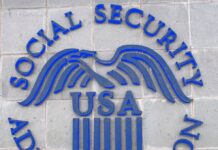And they have chosen their words carefully, not directly rebuking President Trump. His own views ranged from initially demanding the economy reopen by next Sunday, Easter, to warning of more than 200,000 deaths from the coronavirus and extending social-distancing guidelines at least until April 30.
But, in a pair of speeches last week that were delivered before a largely empty House and Senate, Cheney and Cotton mapped out a domestic response to the coronavirus that could have easily been delivered by most Democrats or a moderate Republican.
“In this greatest nation on earth, we protect the sick and the most vulnerable. We owe all we have to our mothers and our fathers, to the generations who came before, and we must do all we can now to protect them,” Cheney said during her March 27 floor speech.
“This frustration has given rise to a new and growing argument that Americans can’t wait any longer, that we ought to open back up and take our chances with this virus. After all, we can’t stay inside forever. We can’t, as the saying goes, let the cure be worse than the disease,” Cotton said in his March 25 speech.
That “not so simple” choice would lead to chaos in health care and the economy, he said. “Hospitals will collapse. Care will be rationed. Doctors will face the terrible choice of whom to save and whom to let perish.”
In follow-up interviews, Cotton and Cheney made clear that their early focus on the virus made them outliers, dismissed by many Republicans who have heard their warnings about China.
Cotton said he specifically delivered his speech after hearing “some on the right” embrace the idea that social distancing practices would cause worse results, economically, than just allowing people to get sick.
“Many Republican senators were voicing that viewpoint,” he said of his private conversations.
Cotton, 42, attended Harvard for both undergraduate and law school, then clerked for a federal judge. In 2005, he enlisted in the Army and led a 101st Airborne Division platoon in Iraq. Elected to the Senate in 2014, Cotton has been a voracious consumer of journals and newsletters on foreign policy, which provided his initial glimpse into the spread of covid-19 in the southern Chinese city of Wuhan.
While other senators fixated on the impeachment trial in January and early February, Cotton devoured virus news. He sought eye contact with Eric Ueland, the White House director of legislative affairs, every time he joined the Trump defense team on the Senate floor.
With a single finger pointing down, Cotton lobbied Ueland during the trial to shut down incoming flights from China to fight the virus’s spread in the United States.
Cheney has been connected to health experts since the early days of her father’s tenure as vice president, among them Scott Gottlieb, who served as a medical expert throughout most of President George W. Bush’s administration.
In early March, when few Republicans understood what was coming, Cheney brought Gottlieb to one of the weekly meetings she leads as chair of the House Republican Conference, the No. 3 GOP leadership post. Having gone on to serve nearly two years as Trump’s FDA director, Gottlieb delivered a blunt warning but was dismissed as an “alarmist” by many in the room, according to two Republicans who attended and spoke on the condition of anonymity to speak freely.
Those Republicans pushed back on his social distancing recommendations and likened the virus to the flu. Gottlieb then delivered a forceful point about their moral duty to save lives.
“This is what can happen. You can’t just say, ‘Let this run through the population,’ ” he said, according to GOP officials in the room.
For Cheney, 53, the issue has an obvious personal connection. Her father, Richard B. Cheney, 79, suffered multiple heart attacks before getting a transplant in 2012, which was followed by taking immune-suppressing drugs to ensure the new heart took. Both his age and condition put him in the at-risk pool if he were to contract covid-19.
In an interview, Cheney declined to talk about her family’s medical status but noted that she has tried to present a blunt picture of what lies ahead. “We have to be realistic about what the future holds,” she said.
Like many Democrats and Republicans, Cheney and Cotton have opted to stay in their Washington-area homes rather than flying across the country to get home during this long congressional recess.
Cheney also declined to attend a House GOP leadership retreat on the Eastern Shore four weekends ago, after CDC guidelines cautioned against nonessential travel.
And the following week, instead of meeting in their usual cramped basement quarters, the GOP started holding conference calls for meetings that Cheney oversees.
But some Republicans have continued to encourage everyday Americans to reject recommendations from Anthony S. Fauci, the nation’s leading infectious disease expert and member of the president’s task force, even as Trump has embraced those experts, at least for now.
“Let’s stop looking at the death counters, and let’s talk about how we can keep as many people employed as possible. That’s the key right now,” Rep. Devin Nunes (R-Calif.) told Fox News on Tuesday, warning that “a hell of a lot more people” will die from a shuttered economy than covid-19.
Sen. John Cornyn (R-Tex.), who has also remained in Washington, said he supports stay-at-home orders in densely populated urban and suburban areas, but he suggested they were not necessary in many rural settings.
“Some places we have more cows than people, okay, and the virus loves the crowd, loves congestion,” Cornyn told reporters after gaveling out Thursday’s brief pro forma session of the Senate.
Cotton and Cheney offer no apologies for their consistent labeling of the “China virus,” which critics say has led to anti-Asian bias domestically.
“I deliberately insist on calling it the China virus,” Cotton said, blaming leaders in Beijing for concealing its early spread.
Cheney said, after the crisis subsides, U.S. officials need a “fundamental rethinking about our relationship with China.”
But that time, according to the two conservatives, is a long way off. In her March 27 floor speech, Cheney exhorted Americans to cheer for Trump as well as two Democratic governors, Andrew M. Cuomo of New York and Gavin Newsom of California.
“This pathogen does not recognize party lines,” she said.
As the Senate was approving the $2 trillion rescue package, Majority Leader Mitch McConnell (R-Ky.) approached Cotton with a mea culpa.
“You were right, and you were first,” McConnell told Cotton. “I thought you were an alarmist.”








